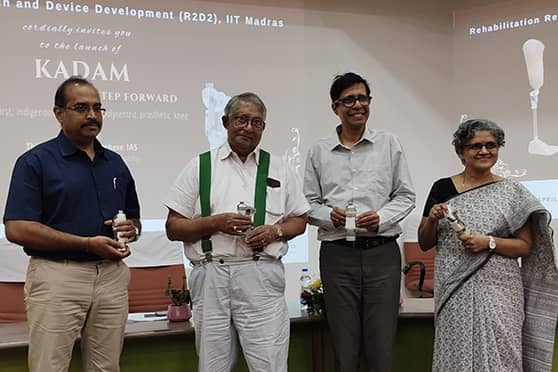IIT Madras researchers launch first indigenously developed Polycentric Prosthetic Knee


Indian Institute of Technology (IIT) Madras researchers have launched India’s first indigenously developed Polycentric Prosthetic Knee called ‘Kadam’ which aims to improve the quality of life for thousands of above-knee amputees.
This product is a polycentric knee developed in association with Society for Biomedical Technology (SBMT) and Mobility India for Above Knee Prosthesis.
According to IIT Madras, Kadam makes it possible for above-knee amputees to walk with a comfortable gait. Not just mobility, it also aims to improve the quality of life of users through increased community participation, access to education, livelihood opportunities and overall well-being.
It was developed by a team at TTK Center for Rehabilitation Research and Device Development (R2D2) at IIT Madras, which also developed and commercialised ‘Arise,’ the country’s first standing wheelchair and NeoFly-NeoBolt – active wheelchair and motorized add-on for seamless indoor-outdoor mobility. R2D2 is involved in research related to human movement, and the design and development of rehabilitation and assistive devices for people with movement impairments.
SBMT, which supported the development, was established under DRDO by former President APJ Abdul Kalam to enable indigenous medical device development. Mobility India, an NGO in Bengaluru, will mass manufacture and take Kadam to the market along with overseeing the processes of fitment and training and ensuring easy access for the users.
Kadam was launched on IIT Madras campus by Tamil Nadu commissioner for persons with disability Thiru Johny Tom Varghese, IIT Madras director V Kamakoti, faculty head of TTK Center for Rehabilitation Research and Device Development (R2D2) Sujatha Srinivasan, and other faculty members.
Addressing the launch event virtually, Varghese said, “What bridges the world of a differently abled person with that of others is technology. It is phenomenal to see how technology can usher in inclusion in all walks of life. Kadam is one such innovation, along with other similarly path-breaking products that came out of R2D2 IIT Madras, which will make technology accessible and affordable.”
According to the researchers, Kadam has advantages over a hinge joint because of the multiple axes of rotation, which provide the user greater control over the prosthesis while walking and maximum knee flexion of 160 degrees to make it easy to sit in cramped spaces like buses and autos. It is designed for durability with high strength stainless steel and aluminium alloy along with hard chrome plated EN8 pins and high fatigue life polymer bushings.
Sujatha Srinivasan, head, TTK Center for Rehabilitation Research and Device Development (R2D2), IIT Madras, said, “Functional needs, socioeconomic and environmental challenges of Indian users are unique. Kadam’s user-centric design takes these into account. It meets international quality standards while being 4-5 times more affordable than comparable imported knees.”
The WHO states that only one in 10 people in need, have access to assistive technology and they are not available in adequate numbers and at affordable prices.